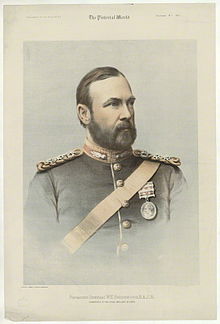William Howley Goodenough
Sir William Howley Goodenough | |
|---|---|
 Sir William Howley Goodenough | |
| Born | 4 April 1833 Wells, Mendip District, Somerset, England |
| Died | 24 October 1898 (aged 65) Erinville, Rondebosch, Western Cape |
| Allegiance | |
| Service | |
| Years of service | 1849-1898 |
| Rank | Lieutenant-General |
| Battles / wars | |
| Awards | Knight Commander of the Order of the Bath |
| Parents |
|
| Relatives | James Graham Goodenough (brother) Samuel Pepys Cockerell (maternal grandfather) |
Lieutenant-General Sir William Howley Goodenough KCB (4 April 1833 – 24 October 1898) was a British Army officer who became General Officer Commanding North-West District.
Military career
[edit]Born the son of Edmund Goodenough, Head Master of Westminster School,[1] Goodenough was commissioned as a second lieutenant in the Royal Artillery on 20 June 1849.[2] He was promoted to lieutenant on 1 April 1851, to captain on 1 January 1856 and to major on 20 July 1858.[3] He fought and was wounded at the Siege of Lucknow during the Indian Rebellion.[1] Promoted to lieutenant-colonel on 25 March 1869, he became military attaché in Vienna in 1871.[1]
He commanded the artillery during the Anglo-Egyptian War in 1882.[4] He went on to be Inspector-General of Royal Artillery in August 1886, General Officer Commanding North-West District in July 1889 and General Officer Commanding, Chatham District in April 1890.[5] His last appointment was as General Officer Commanding-in-Chief, Cape of Good Hope in December 1894, in which capacity he briefly acted as Governor of Cape Colony in 1897, before retiring in October 1898.[5]
References
[edit]- ^ a b c Edmund Burke: Annual register. Longmans Green and Co., 1899
- ^ The new army list, and militia list. 1855, p. 240
- ^ Hart’s annual Army list, Militia list, and Imperial Yeomanry list. 1870, p. 167
- ^ "Lieutenant-General Sir William Howley Goodenough (1833-98)". Royal Collection. Retrieved 23 December 2015.
- ^ a b "Army Commands" (PDF). Retrieved 23 December 2015.

